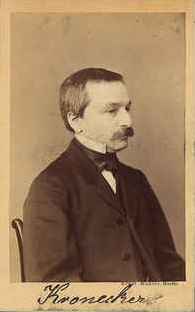Leopold Kronecker
Leopold Kronecker | |
|---|---|
 Leopold Kronecker | |
| Born | December 7, 1823 |
| Died | December 29, 1891 (aged 68) |
| Nationality | Prussian |
| Alma mater | University of Berlin |
| Known for | Kronecker delta Kronecker symbol Kronecker product Kronecker–Weber theorem Kronecker's theorem Kronecker's lemma |
| Scientific career | |
| Fields | Mathematics |
| Institutions | Humboldt University Berlin |
| Doctoral advisor | Johann Encke Gustav Dirichlet |
| Doctoral students | Georg Cantor Kurt Hensel Adolf Kneser Mathias Lerch Franz Mertens |
Leopold Kronecker (December 7, 1823 – December 29, 1891) was a German mathematician and logician who argued that arithmetic and analysis must be founded on "whole numbers", saying, "God made the integers; all else is the work of man" (Bell 1986, p. 477). This put Kronecker in bitter opposition to some of the mathematical extensions of Georg Cantor, Kronecker's student (cf. Davis (2000), pp. 59ff). Kronecker was a student and lifelong friend of Ernst Kummer.
Biography
Leopold Kronecker was born in Liegnitz, Prussia (now Legnica, Poland) into a Jewish family.[1] In 1845, Kronecker wrote his dissertation at the University of Berlin on number theory, giving special formulation to units in certain algebraic number fields. Peter Gustav Dirichlet was his teacher.
After obtaining his degree, Kronecker managed the estate and business of his uncle, producing nothing mathematical for eight years. In his 1853 memoir on the algebraic solvability of equations, Kronecker extended the work of Évariste Galois on the theory of equations. He accepted a professorship at Friedrich-Wilhelms University (today: Humboldt University) of Berlin in 1883.
Kronecker also contributed to the concept of continuity, reconstructing the form of irrational numbers in real numbers. In analysis, Kronecker rejected the formulation of a continuous, nowhere differentiable function by his colleague, Karl Weierstrass. In an 1850 paper, On the Solution of the General Equation of the Fifth Degree, Kronecker solved the quintic equation by applying group theory (though his solution was not in terms of radicals, since this was already proven impossible by Abel–Ruffini theorem).
Kronecker's finitism made him a forerunner of intuitionism in foundations of mathematics.

Named for Kronecker are the Kronecker limit formula, Kronecker delta, Kronecker symbol, Kronecker product, Kronecker–Weber theorem, Kronecker's method for factorizing polynomials, Kronecker's theorem in number theory, and Kronecker's lemma. He was the supervisor of Kurt Hensel, Adolf Kneser, Mathias Lerch, and Franz Mertens, amongst others.
Kronecker died on December 29, 1891 in Berlin. He is buried in the Alter St Matthäus Kirchhof Cemetery in Berlin-Schöneberg, close to Gustav Kirchhoff.
Bibliography
Primary:
- 1887. "On the concept of number" in Ewald, William B., ed., 1996. From Kant to Hilbert: A Source Book in the Foundations of Mathematics, 2 vols. Oxford Uni. Press: 947-55.
- Jean van Heijenoort (1967), From Frege to Godel: A source Book in Mathematical Logic. 1879-1931, Harvard University Press, Cambridge, Mass. ISBN 0-674-32449-8 (pbk.)
Secondary:
- Eric Temple Bell, 1986. Men of Mathematics, Simon and Schuster, New York.
- Martin Davis (2000), Engines of Logic, Mathematicians and the origin of the Computer, W.W. Norton & Company, New York. ISBN 0-393-32229-7 pbk.
References
External links
- O'Connor, John J.; Robertson, Edmund F., "Leopold Kronecker", MacTutor History of Mathematics Archive, University of St Andrews
- Leopold Kronecker at the Mathematics Genealogy Project
- A Polynomial Equation System Solver based on the Kronecker Method.
